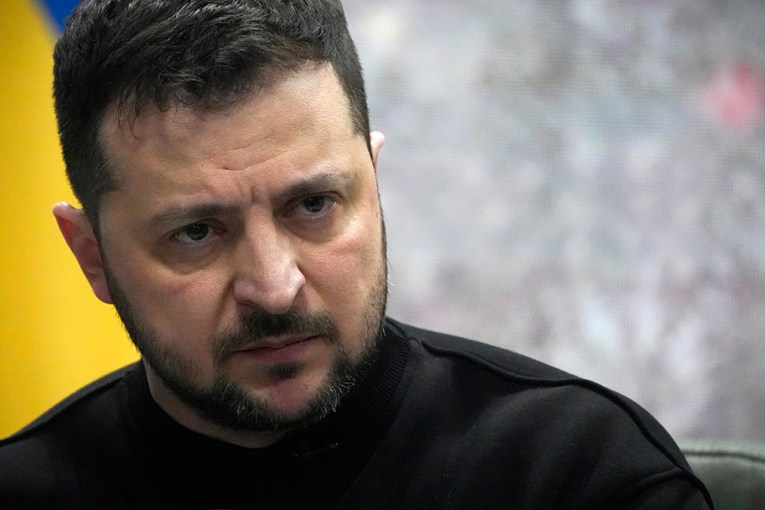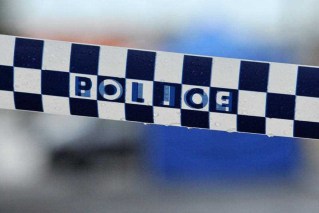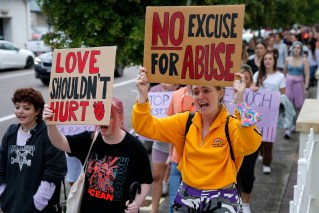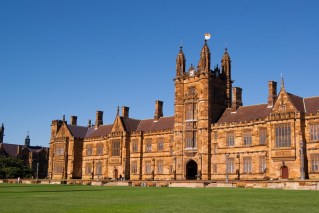Ukraine is declaring a state of emergency and telling its citizens in Russia to flee, as the UN warns the world is “facing a moment of peril”.
Shelling is intensifying in eastern Ukraine, where Russian President Vladimir Putin has recognised the independence of two rebel regions and where Russian troops are being deployed as “peacekeepers”.
But by 6.30am Thursday there was still no clear indication of whether Mr Putin plans to follow that up with a massed assault on Ukraine involving the tens of thousands of troops he has gathered near his neighbour’s borders.
“Predicting what might be the next step of Russia, the separatists or the personal decisions of the Russian president – I cannot say,” Ukraine’s President Volodymyr Zelenskiy said.
Mr Zelenskiy said his country wanted security guarantees from Russia as a step towards ending the stand-off between the two countries.
“I have many times suggested that the president of Russia sit down at the negotiating table and speak,” he said.
As well as planning for a month-long state of emergency, the Ukrainian government has announced all men of fighting age will be required to be ready for military service.
Ukrainians living in Russia (more than 3 million people, according to a 2010 census) have been told to get out of the country to protect their lives.
Ukraine’s parliament has passed the bill for the state of emergency, to come into effect from Thursday morning (local time).
It could stop conscripted reservist soldiers leaving the country so they are ready to be called up to fight, impose curbs on media, and lead to personal document checks.
‘Moment of peril’
Meanwhile, the UN’s General Assembly met to discuss the crisis.
The Assembly was told the US estimates 5 million people could be displaced if Russia invades Ukraine.
UN Secretary General António Guterres said the meeting was happening “in the face of the most serious global peace and security crisis in recent years, and certainly in my time as secretary general”.
He said this moment is one he “truly hoped would not come”.
“The latest developments regarding Ukraine are a cause of grave concern, and they include reports of increased ceasefire violations across the contact line, and a real risk of further escalation on the ground,” Mr Guterres said.
He said he was “fully committed to resolve this crisis without further bloodshed”.
“It is time to establish a ceasefire and return to the path of dialogue and negotiation,” Mr Guterres said.
Russia blames the West as more sanctions loom
Russia denies planning an invasion and has described warnings as anti-Russian hysteria.
But it has taken no steps to withdraw the troops deployed along Ukraine’s frontiers.
On Thursday morning, a spokeswoman for Russia’s foreign ministry, Maria Zakharova, told the BBC the idea that Russia is to blame for the crisis in Ukraine is an invention by the West.
“Lets talk about the reputation of the West…how many people have been killed because of Washington and London,” she said, in response to a question about Russia annexing Crimea in 2014.
“The West’s reputation is covered in blood.”
Ms Zakharova said sanctions were designed to halt Russia’s “development”.
The US has described Russia’s actions as the start of an “invasion” but along with allies has so far unveiled mostly incremental sanctions while making clear they were keeping tougher measures in reserve in case of a full-scale invasion.
The New York Times reports that information from two US government officials suggests the next step would be that the Biden administration would issue economic sanctions on the company building the gas pipeline connecting Russia to Germany.
US President Joe Biden later confirmed the plan, saying: “I have directed my administration to impose sanctions on Nord Stream 2 AG and its corporate officers”.
US deputy Treasury secretary Wally Adeyemo said on CNBC on Thursday morning that government would also be prepared to impose a ban on exports of American technology that are vital to the Russian economy.
“If he [Mr Putin] chooses to invade, what we’re telling him very directly is that we’re going to cut that off, we’re going to cut him off from Western technology that’s critical to advancing his military, cut him off from Western financial resources that will be critical to feeding his economy and also to enriching himself,” Mr Adeyemo said.
European Union sanctions approved on Wednesday will add all members of Russia’s lower house of parliament who voted to recognise the separatist regions in Ukraine to a blacklist, freezing their assets and banning travel.
EU leaders will also hold an emergency summit on Thursday to discuss what to do next.
The UK announced restrictions banning Russia from the issuing of new bonds in its security markets and called for its broadcasting regulator to investigate Russia’s RT international TV news channel as a propaganda outlet.
“There will be even more tough sanctions on key oligarchs, on key organisations in Russia, limiting Russia’s access to the financial markets, if there is a full scale invasion of Ukraine,” UK Foreign Secretary Liz Truss said.
Allies’ sanctions are designed to hit Russia’s elite including Mr Putin’s inner-circle and their families.
Breakaway-region leaders speak
The Russian-backed leader of the breakaway Donetsk region said on Wednesday he wanted to peacefully settle its borders with Ukraine but reserved the right to ask Russia for help.
Meanwhile, Denis Pushilin, who heads the self-proclaimed Donetsk People’s Republic that was recognised by Russia this week, said he favoured dialogue with Ukraine in the first instance.
But he told a news conference the situation in their long-running conflict had become critical and the separatists would win with support from “big Russia”.
Russia’s recognition of Donetsk and the neighbouring self-proclaimed Lugansk People’s Republic on Monday was declared illegal by the US and many of its allies.
“Aggression from the Ukrainian side is growing,” Mr Pushilin said, accusing officials in Kyiv of staging “provocations” and causing civilian casualties.
Ukraine denies accusations by the separatists that it is stoking the conflict with the aim of recapturing their territory by force.
Mr Pushilin said a relocation of women and children which began last week was necessary to enable the separatist army to focus on defending the borders of their territory.
Ukraine’s military said one soldier had been killed and six wounded in increased shelling by pro-Russian separatists using heavy artillery, mortar bombs and Grad rocket systems in the two breakaway areas over the previous 24 hours.
-with AAP









